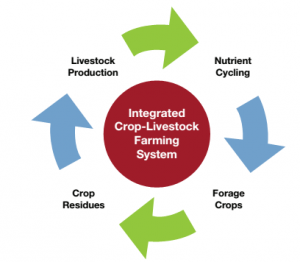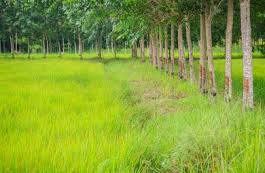INTEGRATED FARMING SYSTEM
DEFINITION–
As the term “integrate” means to form into one whole. It refers to Integration of various agricultural enterprises like crop production, animal husbandry, fishery, forestry etc. which not only supplement the income of the farmers but also help in increasing the family labor employment.
- This system is a whole farm management system which aims to deliver more sustainable agriculture.
- It is a dynamic approach which can be applied to any farming system.
- Integrated Farming combines the best of modern tools and technologies with traditional practices based on site and situation. It means using many ways of cultivation on a piece of land.
- Integrated Farming System (IFS) is an interdependent, interrelated often interlocking production systems based on crop production, rearing animals and related subsidiary enterprises in such a way that maximize the utilization of resources of each system and also minimize the negative effect of these enterprises on environment.

IMPORTANCE OF IFS
- Rejuvenation of systems productivity and maintain agro ecological equilibrium.
- Control the spread of insects-pest, diseases and weeds population through natural cropping system management and keep them at low level of intensity.
- Reducing the use of chemical fertilizer and other harmful agrochemicals and pesticides to maintain the natural equilibrium.
- The entire farm wastes and by products is recycled and used as inputs to other enterprise.
- A better integration of agricultural enterprises like dairy, poultry, piggery, fishery, sericulture etc. suited to the given agro-climatic conditions and socio-economic status of the farmers resulted in prosperity of farmers.

Integrated farming, Tree plantation
COMPONENTS OF INTEGRATED FARMING SYSTEM
- Major components are crops, livestock, birds and trees.
- Crop may have subsystem like mixed/intercrop, multi-tier crops, legumes, oilseeds, forage etc.
- Livestock components may be milch cattle, goat, sheep, poultry, and bees.
- Tree components may include timer, fuel, fodder and fruit trees.
Integrated farming system models may vary widely in each agro-climatic zones depending on location specific, natural resource availability like rainfall, and other climatic factors, soil types and marketability etc.
Read more..
CROP ROTATION- CHOICE & BENEFITS
SUBSISTENCE FARMING-HISTORY & TYPES
WHAT IS IRRIGATION- DIFFERENT METHODS
DIFFERENCE BETWEEN CLIMATE & WEATHER
WHAT IS SOIL EROSION- TYPES & MECHANISM